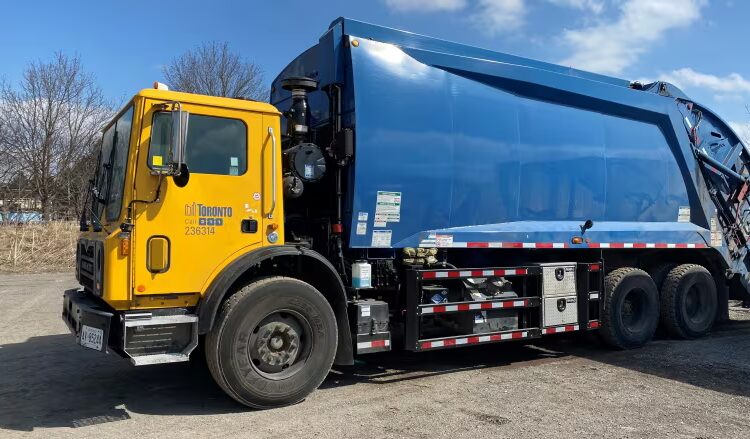City council committee to consider $5.6M plan to protect cyclists, pedestrians
Toronto is considering spending $5.6 million to retrofit all city-owned heavy duty trucks with side guards to protect cyclists and pedestrians, Mayor Olivia Chow says.
City staff are recommending that Toronto retrofit all 500 of its heavy duty vehicles by 2026. The city has already installed side guards on 30 vehicles. Another 219 are estimated to be retrofitted with side guards in the next year.
The cost to retrofit one vehicle is between $10,000 and $11,000, city staff said.
A staff report on the issue will be considered by city council’s infrastructure and environment committee on Nov. 27 and council itself on Dec. 17.
Side guards are protective railings, or three long steel bars, mounted on the sides of large trucks that block the space between axles. The side guards help to prevent cyclists and pedestrians from being pulled under the wheels of a truck during a collision. Side guards are also known as lateral protective devices.
“It means saving lives. It means less tragedy. It means safety,” Chow told reporters at the city’s Fleet Services yard on Eastern Avenue.

According to the city, research from the United Kingdom, Australia, and Netherlands shows that side guards can reduce cyclist fatalities by about 62 per cent, pedestrian fatalities by 20 per cent and serious injuries for cyclists by six per cent.
There are no federal or provincial requirements for vehicles to be fitted with side guards in Canada.
The mayor told the story of Jenna Morrison, a 38-year-old yoga instructor and mother who died in November 2011 beneath the wheels of a truck at the corner of Dundas Street W. and Sterling Avenue. She left behind a husband and a five-year-old son, and was pregnant with her second child.
Chow vowed at the time to do something to prevent such a tragedy from happening again.
She said she has been pushing governments at all levels to see side guards installed on heavy duty trucks across the country for over a decade. As an MP, she introduced a private member’s bill alongside families who lost loved ones in collisions with heavy-duty trucks.
Chow said her lobbying fell short at the federal level.
“It is mostly the lobbying effort of the trucking industry that’s stood in the way between Transport Canada making the right decision,” she said.
Safety, cycling advocates support plan
Brian Patterson, president and CEO of Ontario Safety League, said on Wednesday that he supports the city’s plan and he would like to see it expanded to include city contractors.
Given the cost of retrofitting one vehicle, he said it could keep some companies from bidding on city work.
“But if I choose to be a provider to the City of Toronto, I should choose to be the safest provider. And if the mayor is given a little bit of a nudge in the right direction, I’m all for it.”
- Vancouver council mandates side guards for city-owned heavy trucks after cyclist’s death
- Lawyer, advocate debate merits of safety side guards on Halifax trucks
Michael Longfield, executive director of Cycle Toronto, a member-supported charity working to make Toronto a healthier cycling city, said side guards could save lives and the move is long overdue and a great step forward.
“We’ve been talking about it for over a decade. Certainly, it’s something we’d like to see at a provincial and federal level. But the city not waiting for that and choosing to step up now, I think, is a really great sign.”

The Ontario Trucking Association, however, is skeptical about the move. The association, which speaks for the Ontario trucking industry, released a statement on Wednesday saying studies of the side guards have produced conflicting data and requiring them on all private vehicles would not increase safety.
“While OTA has no objection to municipal requirement to install side guards — officially known as lateral protection devices — on government vehicles, the association maintains that any potential policy to mandate side guards on all private vehicles would not accomplish the desired safety outcomes some political leaders imagine,” the association said in the statement.
“Transport Canada, which has completed a number of studies on this issue in Canada, concludes there is no clear evidence side guards or side skirts would prevent or reduce injuries or fatalities.”
Staff told reporters on Wednesday that Halifax, Montreal, Vancouver and Victoria have already installed side guards on their vehicles.
In the report, staff say the plan is in keeping with the city’s Vision Zero road safety plan, focused on reducing road death and injuries on Toronto’s streets.
Dakota Brasier, spokesperson for Ontario’s Ministry of Transportation (MTO), said in an email: “Transport Canada regulates the mandatory use of side guards and has completed several studies on this issue which concluded that there is no clear evidence that side guards, or side skirts, would prevent or reduce injuries or fatalities.
“MTO is not considering mandating side guards on large trucks at this time, but will continue to monitor research, studies and best practices in other jurisdictions to inform future policy decisions.”


